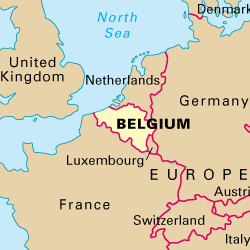Belgium Takes Fight Against iGaming To Whole New Level

Since Belgium’s new coalition government came to power, the Belgian Gaming Commission (BGC) has aggressively been going after unauthorized online gambling operators and subsequently forced any gambling operator wishing to offer its product inside the country to partner up with Belgium brick-and-mortar casinos. At the heart of the Belgian Gaming Commission’s apparent concern is the need to protect underage gamblers, and so the gambling watchdog has been demanding more funding and staff to go after and prosecute those online gambling operators without a Belgium iGaming license, as well as those Belgium players gambling on such sites.
Now, the BGC has upped the ante further after requesting that free casino and poker apps for mobile devices be added to the country’s rapidly growing list of blacklisted companies, and that Belgium poker players should be taxed by 75% on their earnings.
Social gaming operator blacklist
Four years ago the Belgian Gaming Commission created an online gambling blacklist, which by March this year had swelled to 97 companies with a legion of big name poker operators finding their way onto the list, including the likes of Everest, Titan, 888, Winamax, Betsson, William Hill, Betfair, PKR, and Betsafe.
A number of social gaming firms had also been added to the country’s real-money blacklist, and now the BGC is seeking to compliment its online gambling blacklist by creating an independent social gaming operator blacklist targeting companies which offer free “play-for-fun” poker and casino game applications. According to the BGC, such apps are problematic because of the difficulty involved in verifying the age of gambler, and the likelihood these games could subsequently influence underage gambling and create addictive behaviors.
One story which made the Belgian National newspaper ‘Het Nieuwsblad‘ recently, for instance, involved a 15 year-old boy who apparently spent €37,000 ($46,000) on a free-to-play app called ‘Game of War: Fire Age’, using his mother’s credit card. Similar stories have been reported in Britain, and following a series of complaints from customers, the UK Office of Fair Trading felt compelled to issue a new guidelines for those companies offering free-to-play game apps.
“Following our market investigation in 2013, we had concerns that there were industry-wide practices that were potentially misleading, commercially aggressive or otherwise unfair,” the UK Office of Fair Trading explained.
Poker players targeted with 75% tax
In addition, the country’s top poker players are also being targeted by the BGC and will soon have to pay roughly 75% of their winnings to the Belgium government. Up until now, poker had been subject to the same tax regime as Belgian gaming law which states that gambling winnings should be viewed as an “exceptional event” and so be tax-free. Now, however, the authorities have decided that money earned by poker players cannot be equated to the sudden windfall experienced by gamblers, with an official statement, explaining:
“An individual who plays poker regularly and who devotes enough time and efforts to the game to make it a profession should declare his winnings as if they were any other form of professional income.”
Nevertheless, according to Belgian fiscal expert Michel Maus, the exorbitant tax law will only be imposed on the country’s top poker professionals, numbering around twenty players, while with their professions officially recognized as a job these players would then be allowed to deduct their poker losses, transport costs, accommodation, etc as legitimate business expenses in order to get tax breaks.
Poker players on the list would most probably include those featured on Belgium’s ‘All Time Money List,’ including the country’s biggest tournament winner Davidi Kitai with $5,166,846 in winnings, as well as Pierre Neuville ($2.07m), Kevin Vandersmissen ($1.64m), and Michael Gathy ($1.24m).
Heaven help those breaking the law
Anyone then found flaunting Belgium’s gambling laws could face some of the harshest penalties in the EU, which includes thousands of euros fines, or even time in prison. According to the Belgian Gaming Act, for instance, any person caught playing illegal games of chance could receive between one month and three years behind bars and a fine of up to €150,000, which can subsequently be doubled for those persons re-offending.
Likewise, earlier this year Betclic Everest Group had €600,000 seized by Belgium’s Public Prosecution Office (PPO) for operating without a license and back in 2012 bwin.party CEO Norbert Teufelberger was also detained by Belgian authorities on similar charges. At the time, a number of gaming bosses had a critical letter published in the UK’s Financial Times, with an extract stating:
“While the Belgian authorities are free to intimidate Europe’s leading online gaming groups with threats about the consequences of challenging their domestic gambling laws, the European Commission has yet to receive an answer to its own concerns regarding the regulatory regime in Belgium.”










